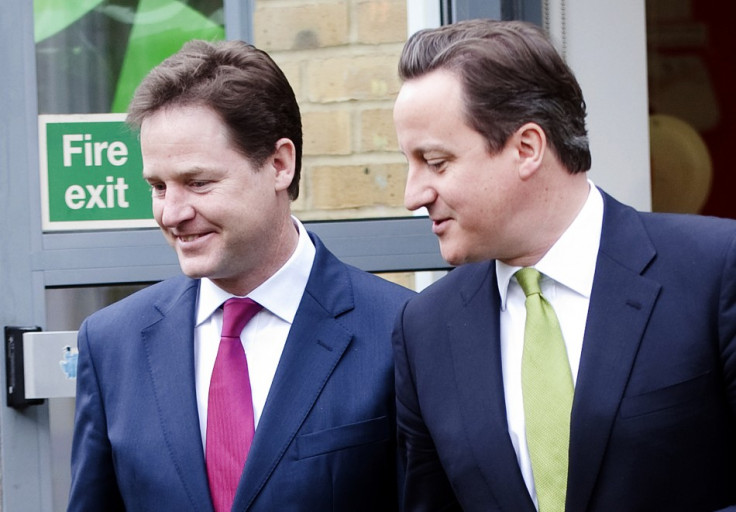Nick Clegg Talks About New Coalition But is Anyone Listening?

Deputy prime minister Nick Clegg has taken a decisive new step away from the Tory party towards Labour by suggesting he could form a coalition with Ed Miliband after the next election.
Clegg also hinted that he is losing patience with David Cameron.
His comments are seen as the clearest sign yet that Clegg is attempting to keep his party in the equation as election day approaches. And he's also been responding to a more conciliatory tone from Labour politicians, most notably shadow chancellor Ed Balls in recent week.
But there were also suspicions that Clegg's move has as much to do with an attempt to save his own skin, should Labour win the poll with insufficient numbers to form a majority government.
It had always been expected that Labour would only ever consider a post-election deal with the Lib Dems if Clegg was removed. He is widely distrusted by Labour MPs and is too closely allied to the Tory government.
But after Balls praised Clegg's integrity earlier this year it was speculated there was a thawing of relations in an attempt to clear the decks of any post election obstacles to a Lib-Lab coalition.
What I'm looking for is a majority Labour government. There are such big issues that the country faces, I think Nick Clegg should be worried about the Liberal Democrats.
Now, in comments included in a BBC Radio 4 documentary, the Liberal Democrat leader says Labour had changed and he could now envisage sharing power with the party. He also said that the Tories had also changed, but in the wrong direction.
"I think there's nothing like the prospect of reality in an election to get politicians to think again, and the Labour party, which is a party unused to sharing power with others, is realising that it might have to," he said.
But when asked about the Tories, he said: "The Conservative party has changed quite dramatically since we entered into coalition with them. They've become much more ideological, they've returned much more to a lot of their familiar theme tunes.
"I think it would be best for everybody if the Conservative party were to rediscover a talent for actually talking to mainstream voters about mainstream concerns."
There is, of course, just one problem with all this – is another coalition with anyone a real prospect after the general election next year?
Ed Miliband was, understandably, refusing to be drawn on Clegg's latest remarks, saying: "What I'm looking for is a majority Labour government. There are such big issues that the country faces, I think Nick Clegg should be worried about the Liberal Democrats."
Clearly, if neither party wins an outright majority it would be one of the options. But there are others and, following the performance of the current coalition, there are plenty of reasons to believe they might be more attractive than doing a deal with Clegg, or even a replacement like Vince Cable, said to be Labour's favourite.
There is still huge resistance in Labour ranks to the Lib Dems, and Clegg in particular who many believe has been far too willing to go along with Tory policies on the economy and elsewhere. Old animosities dating back decades can not be discounted either.
In the event Labour was the biggest party but short of a majority, Miliband would be under intense pressure to go it alone perhaps, at best, with informal support from the Lib Dems on specific issues in Commons votes.
Things are more difficult for Cameron. If he fails again to get an overall majority his own position will be in real doubt and Tory insiders have made it clear they, too, would rather see the party attempt to rule as a minority than get locked into another deal with the Lib Dems.
A minority government of either Labour or the Tories would then most likely hold another election within six months or so, to end political uncertainty, and seek an outright majority.
So, while Clegg may be trying to position himself as post-election king maker, there remains the strong possibility no one will come knocking on his door in the first place.
© Copyright IBTimes 2025. All rights reserved.






















